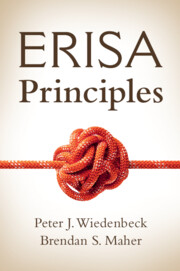Book contents
- ERISA Principles
- ERISA Principles
- Copyright page
- Contents
- Acknowledgments
- Table of Cases
- Table of Legislation
- Table of Rules and Regulations
- Part I General Considerations
- Part II Conduct Controls: Welfare and Pension Plans
- 3 Disclosure
- 4 Fiduciary Obligations
- 5 Enforcement
- 6 Preemption
- Part III Content Controls: Pension Plans
- Part IV Tax Controls: Qualified Retirement Savings
- Part V Health Plan Content Controls
- Appendix ERISA’s Legislative History
- Index
6 - Preemption
from Part II - Conduct Controls: Welfare and Pension Plans
Published online by Cambridge University Press: 15 February 2024
- ERISA Principles
- ERISA Principles
- Copyright page
- Contents
- Acknowledgments
- Table of Cases
- Table of Legislation
- Table of Rules and Regulations
- Part I General Considerations
- Part II Conduct Controls: Welfare and Pension Plans
- 3 Disclosure
- 4 Fiduciary Obligations
- 5 Enforcement
- 6 Preemption
- Part III Content Controls: Pension Plans
- Part IV Tax Controls: Qualified Retirement Savings
- Part V Health Plan Content Controls
- Appendix ERISA’s Legislative History
- Index
Summary
ERISA preemption is broad and bewildering. The statute’s language is of little help and the Supreme Court has struggled to identify intelligible extra-textual limits on ERISA’s preemptive reach. ERISA’s express preemption exerts force largely through the "relate to" clause, which broadly preempts all laws that bear too closely on employee benefit plans; the savings clause, which saves from preemption laws that regulate banking, securities, or insurance; and the deemer clause, which prevents states from regulating plans as insurers. ERISA also impliedly preempts state laws that conflict with its provisions or frustrate its objectives. More fruitful than parsing the Court’s decisions is to focus on the categories of laws the Court has found preempted, namely, laws affecting the benefits plans must offer, laws affecting the uniform administrative practice of plans, and laws supplementing ERISA’s remedies. The coherence of the Court’s jurisprudence might be improved were it to read ERISA’s express preemption provisions as simple field preemption, with legitimate state regulation in fields outside of employee benefits to be superseded only by the application of standard principles of conflict and obstacle preemption.
Keywords
Information
- Type
- Chapter
- Information
- ERISA Principles , pp. 193 - 224Publisher: Cambridge University PressPrint publication year: 2024
